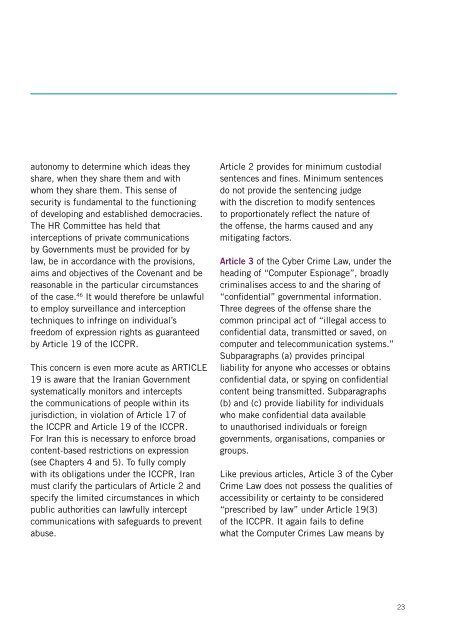Islamic Republic of Iran: Computer Crimes Law
Islamic Republic of Iran: Computer Crimes Law
Islamic Republic of Iran: Computer Crimes Law
You also want an ePaper? Increase the reach of your titles
YUMPU automatically turns print PDFs into web optimized ePapers that Google loves.
Myroslava Gongadze (widow <strong>of</strong> Georgiy Gongadze) 14<br />
autonomy to determine which ideas they<br />
share, when they share them and with<br />
whom they share them. This sense <strong>of</strong><br />
security is fundamental to the functioning<br />
<strong>of</strong> developing and established democracies.<br />
The HR Committee has held that<br />
interceptions <strong>of</strong> private communications<br />
by Governments must be provided for by<br />
law, be in accordance with the provisions,<br />
aims and objectives <strong>of</strong> the Covenant and be<br />
reasonable in the particular circumstances<br />
<strong>of</strong> the case. 46 It would therefore be unlawful<br />
to employ surveillance and interception<br />
techniques to infringe on individual’s<br />
freedom <strong>of</strong> expression rights as guaranteed<br />
by Article 19 <strong>of</strong> the ICCPR.<br />
This concern is even more acute as ARTICLE<br />
19 is aware that the <strong>Iran</strong>ian Government<br />
systematically monitors and intercepts<br />
the communications <strong>of</strong> people within its<br />
jurisdiction, in violation <strong>of</strong> Article 17 <strong>of</strong><br />
the ICCPR and Article 19 <strong>of</strong> the ICCPR.<br />
For <strong>Iran</strong> this is necessary to enforce broad<br />
content-based restrictions on expression<br />
(see Chapters 4 and 5). To fully comply<br />
with its obligations under the ICCPR, <strong>Iran</strong><br />
must clarify the particulars <strong>of</strong> Article 2 and<br />
specify the limited circumstances in which<br />
public authorities can lawfully intercept<br />
communications with safeguards to prevent<br />
abuse.<br />
Article 2 provides for minimum custodial<br />
sentences and fines. Minimum sentences<br />
do not provide the sentencing judge<br />
with the discretion to modify sentences<br />
to proportionately reflect the nature <strong>of</strong><br />
the <strong>of</strong>fense, the harms caused and any<br />
mitigating factors.<br />
Article 3 <strong>of</strong> the Cyber Crime <strong>Law</strong>, under the<br />
heading <strong>of</strong> “<strong>Computer</strong> Espionage”, broadly<br />
criminalises access to and the sharing <strong>of</strong><br />
“confidential” governmental information.<br />
Three degrees <strong>of</strong> the <strong>of</strong>fense share the<br />
common principal act <strong>of</strong> “illegal access to<br />
confidential data, transmitted or saved, on<br />
computer and telecommunication systems.”<br />
Subparagraphs (a) provides principal<br />
liability for anyone who accesses or obtains<br />
confidential data, or spying on confidential<br />
content being transmitted. Subparagraphs<br />
(b) and (c) provide liability for individuals<br />
who make confidential data available<br />
to unauthorised individuals or foreign<br />
governments, organisations, companies or<br />
groups.<br />
Like previous articles, Article 3 <strong>of</strong> the Cyber<br />
Crime <strong>Law</strong> does not possess the qualities <strong>of</strong><br />
accessibility or certainty to be considered<br />
“prescribed by law” under Article 19(3)<br />
<strong>of</strong> the ICCPR. It again fails to define<br />
what the <strong>Computer</strong> <strong>Crimes</strong> <strong>Law</strong> means by<br />
23


